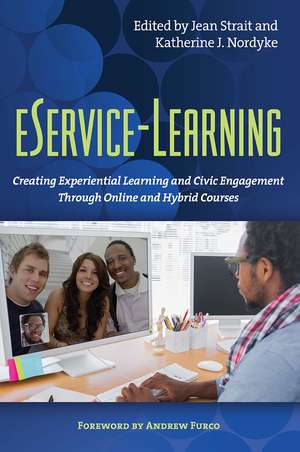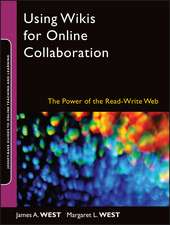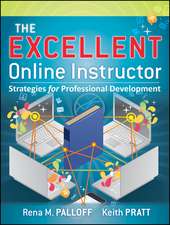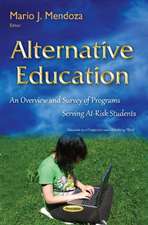eService-Learning: Creating Experiential Learning and Civic Engagement Through Online and Hybrid Courses
Editat de Jean R. Strait, Katherine Nordykeen Limba Engleză Paperback – iun 2015
| Toate formatele și edițiile | Preț | Express |
|---|---|---|
| Paperback (1) | 277.61 lei 6-8 săpt. | |
| Taylor & Francis – iun 2015 | 277.61 lei 6-8 săpt. | |
| Hardback (1) | 999.16 lei 6-8 săpt. | |
| Taylor & Francis – 8 iun 2015 | 999.16 lei 6-8 săpt. |
Preț: 277.61 lei
Nou
Puncte Express: 416
Preț estimativ în valută:
53.14€ • 57.74$ • 44.66£
53.14€ • 57.74$ • 44.66£
Carte tipărită la comandă
Livrare economică 21 aprilie-05 mai
Preluare comenzi: 021 569.72.76
Specificații
ISBN-13: 9781620360644
ISBN-10: 1620360640
Pagini: 192
Dimensiuni: 152 x 229 x 13 mm
Greutate: 0.29 kg
Ediția:1
Editura: Taylor & Francis
Colecția Routledge
Locul publicării:Oxford, United Kingdom
ISBN-10: 1620360640
Pagini: 192
Dimensiuni: 152 x 229 x 13 mm
Greutate: 0.29 kg
Ediția:1
Editura: Taylor & Francis
Colecția Routledge
Locul publicării:Oxford, United Kingdom
Public țintă
PostgraduateCuprins
Foreword—Andrew Furco, University of Minnesota Acknowledgements Introduction Part One. Essentials,Components, and Nuts and Bolts of eService-Learning 1. Pedagogy of Civic Engagement, High-Impact Practices, and eService-learning—Jean Strait and Jane Turk, Hamline University and Katherine J. Nordyke, Missouri State University 2. eService-Learning. Breaking Through the Barrier—Leora Waldner, Troy University 3. Developing an eService-Learning Experience for Online Courses—Katherine J. Nordyke 4. Supporting eService-Learning Through Technology—Jean Strait Part Two. Models for eService-Learning 5. Hybrid I. Missouri State University Embraces eService-Learning—Katherine J. Nordyke 6. Hybrid II. A Model Design for Web Development—Pauline Mosley, Pace University 7. Hybrid III. Each One, Teach One. Lessons from the Storm—Jean Strait 8. Hybrid IV. Extreme eService-Learning. Online Service-Learning in an Online BusinessCourse—Sue McGorry, DeSales University 9. Mixed Hybrid. Hybrid I and Hybrid III eService-Learning. Investigating the Influence of Online Components on Service-Learning Outcomes at the University of Georgia—Paul Matthews, University of Georgia Part Three. Next Steps and Future Directions 10. Community Engagement and Technology for a More Relevant Higher Education—John Hamerlinck, Minnesota Campus Compact 11. Conclusions, Recommendations, and Final Thoughts—Jean Strait, Hamline University Editors and Contributors Index
Notă biografică
Jean R. Strait is Director of the Center for Excellence in Urban Teaching. She brings a wealth of first-hand experience in the classroom—having taught reading, literacy, and educational psychology in higher education for the past 20 years. She has also developed and led urban teacher programs with service-learning components at two-year and four-year colleges throughout the Twin Cities. In addition, Dr. Strait has created programs to train adults in the Dakota Language and has helped refugee teachers become licensed in Minnesota. “Literacy is at the heart of all my teaching,” she says. Katherine Nordyke is Director, Citizenship and Service Learning, Citizenship and Service Learning, Missouri State University. Andrew Furco is Associate Vice President for Public Engagement at the University of Minnesota, where is also serves as an Associate Professor of Higher Education. His research studies have explored the role of community engagement in K-12 and higher education, both in the U.S. and abroad. His publications include the books Service-Learning: The Essence of the Pedagogy (with. S. Billig), Service-Learning Through a Multidisciplinary Lens (with S. Billig), and Service-Learning: Does it Measure Up (with V. Jagla and J. Strait). Prior to arriving in Minnesota, he served as a faculty member in the Graduate School of Education at UC Berkeley and as Director of Berkeley’s Service-Learning Research and Development Center. He currently serves as a board member of the International Association for Research on Service-Learning and Community Engagement (IARSLCE).
Recenzii
“This book is to be commended for articulating a rationale for including outcomes related to civic engagement and service-learning in higher education and best practices for using online technologies to implement eService-Learning in courses and curricula. A conspicuous strength is the description of various eService-Learning models. As such, the volume is particularly valuable for faculty and administrators in higher education.”
Reflective Teaching (Wabash Center)
“Given the growing popularity of both e-learning and service-learning, something powerful is likely to happen when these two educational practices converge. And as is described in the chapters of this volume, e-Service-Learning has the potential to provide students with high impact, transformative learning experiences. It is through this volume that we learn how eService-Learning contains features of both e-learning and service-learning, but yet its essence is one that is distinct from either of these foundational instructional practices. Like the emergence of a new color when two distinct colors are blended, eService-Learning takes the high impact components of two different pedagogies to create a new, different, and unique educational experience for students.
As one of the first volumes to explore the practice of eService-Learning, EService-Learning: Creating Experiential Learning and Civic Engagement through Online and Hybrid Courses not only offers practitioners an understanding of the essentials of this emerging pedagogy, but it also explores important and key questions on the subject, laying the groundwork for further exploration and study. The field of eService-Learning is sure to gain prominence and popularity in the coming years. We will certainly look back at this book as a seminal volume that sought to unveil the power, complexity, and potential of this promising educational practice.”
Andrew Furco
University of Minnesota
Reflective Teaching (Wabash Center)
“Given the growing popularity of both e-learning and service-learning, something powerful is likely to happen when these two educational practices converge. And as is described in the chapters of this volume, e-Service-Learning has the potential to provide students with high impact, transformative learning experiences. It is through this volume that we learn how eService-Learning contains features of both e-learning and service-learning, but yet its essence is one that is distinct from either of these foundational instructional practices. Like the emergence of a new color when two distinct colors are blended, eService-Learning takes the high impact components of two different pedagogies to create a new, different, and unique educational experience for students.
As one of the first volumes to explore the practice of eService-Learning, EService-Learning: Creating Experiential Learning and Civic Engagement through Online and Hybrid Courses not only offers practitioners an understanding of the essentials of this emerging pedagogy, but it also explores important and key questions on the subject, laying the groundwork for further exploration and study. The field of eService-Learning is sure to gain prominence and popularity in the coming years. We will certainly look back at this book as a seminal volume that sought to unveil the power, complexity, and potential of this promising educational practice.”
Andrew Furco
University of Minnesota
Descriere
This book serves as an introduction to using online teaching technologies and hybrid forms of teaching for experiential learning and civic engagement.












